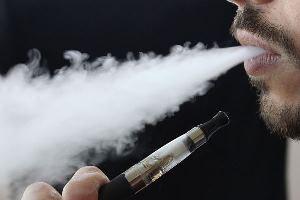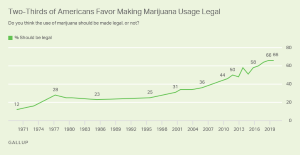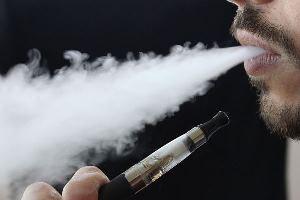While the culprit appears to be black market THC vapes, states are responding by banning flavored pot and nicotine vapes.
Connecticut gets more qualifying conditions, Georgia's program is stalled, Rhode Island's governor and legislature are in a court battle over who will regulate medical marijuana and hemp, and more.
A Louisiana narc with a pain pill habit goes down, a Texas school resource officer gets caught pilfering pain pills, and more.
A federal court says the DEA is doing what it needs to in processing marijuana research applications, more opioid makers and distributors settle and pay out over the opioid crisis, the Honduran president's brother has been convicted of drug trafficking conspiracy in New York, and more.
A Massachusetts judge has upheld the Republican governor's ban on vaping product sales, Houston police get a new dope squad in the wake of a botched fatal drug raid, a key Mexican lawmaker calls for drug legalization as a means of reducing violence, and more.
Support for marijuana legalization holds steady at 66% in the latest Gallup poll, the Chicago city council approves a resolution on natural psychedelics, British MPs call for drug decriminalization, and more.
A Kansas City city council meeting over marijuana decriminalization gets heated, a Florida poll shows good numbers for marijuana legalization, The Lancet comes out swinging on drug decriminalization, and more.
Democratic presidential contenders talk drug policy, a new California marijuana legalization initiative is approved for signature gathering, a Massachusetts judge partially lifts a pot vaping ban, and more.
Some Nebraskans want to see a return to increased drug testing in child welfare cases, Mexico's marijuana legalization advances but faces a delay, the INCB criticizes the Australia National Capital Territory over marijuana legalization, and more.
We're starting to see pot bills getting filed for next year, a push to ease laws on natural psychedelics is expanding into more cities, Mexico's marijuana legalization push hits a bump, and more.
According to the October 18 update from the Centers for Disease Control and Prevention (CDC), 1,299 cases of severe lung injury associated with the use of vaping products have now been reported since cases first started appearing this summer. They've been reported in 49 states and the District of Columbia. And 26 people have died.
The update also provides this new syndrome with a name: E-cigarette or Vaping, product use Associated Lung Injury (EVALI).
In the update, the CDC notes that "all patients have reported a history of using e-cigarette, or vaping, products" and that "most patients report a history of using THC-containing products."
As EVALI cases began piling up this fall, the Food and Drug Administration (FDA) warned consumers early this month to "stop using THC-containing vaping products and any vaping products obtained off the street." The CDC was on the same page, recommending that people "should not use e-cigarette or vaping products that contain THC," buy black market vaping or e-cig products, especially those containing THC, or modify or add any substances to e-cig and vaping products.
Something new is going on. Marijuana and nicotine vaping products have been around for more than a decade by now -- who remembers the massive Volcano vape from early in this century? -- and the most popular nicotine vaping brand, Juul, has been on the market for more than four years. Yet this wave of vaping-related illness only broke out this summer.
The culprit increasingly appears to be black market THC vaping cartridges contaminated with new additives, particularly thinners including propylene glycol (PEG), Vitamin E acetate, and medium chain triglycerides (MCT oil). The FDA has begun investigating Vitamin E acetate, while public health officials in New York have found the substance in a majority of seized vape cartridges there. The FDA also announced in August that it is proposing adding PEG as a "respiratory toxicant" in its list of harmful tobacco product ingredients.
While federal health officials have been busy trying to find the actual cause of the EVALI outbreak, elected and public health officials at the state level have typically responded with much broader restrictions on vaping products overall, especially flavored vaping products for both nicotine and marijuana.
In doing so, they are conflating two separate concerns -- youth vaping and this new vaping illness -- and coming up with responses that use the latter to take broad aim at the former. The problem with vaping illness increasingly appears to be not flavored vapes nor legal THC vapes; it's black market THC vapes using specific additives. Nonetheless, here's how governments have responded:
- In Massachusetts, Gov. Charlie Baker (R) last month declared a public health emergency and banned all vaping products and devices. "The use of e-cigarettes and marijuana vaping products is exploding, and we are seeing reports of serious lung illnesses, particularly in our young people," Baker said as he announced the ban. Medical marijuana patients can still vape, though.
- In Michigan, Gov. Gretchen Whitmer (D) used emergency administrative regulatory powers to make Michigan the first state to announce a ban on flavored nicotine products. "As governor, my No. 1 priority is keeping our kids safe," Whitmer said in a statement. "And right now, companies selling vaping products are using candy flavors to hook children on nicotine and misleading claims to promote the belief that these products are safe. That ends today."
- In New York, Gov. Andrew Cuomo (D) announced a ban on the sale of flavored e-cigarettes in September, citing both the outbreak of lung injury and concerns over teenage e-cig vaping. But that ban has been temporarily blocked in the courts in response to a challenge from the vaping industry.
- In Oregon, Gov. Kathleen Brown (D) ordered a six-month ban on all flavored vaping products early this month. In a joint statement, the Oregon Liquor Control Commission (which regulates marijuana) and the Oregon Health Authority said the emergency rules "are significant steps toward stemming the well-documented tide of e-cigarette use and vaping by youth, as well as keeping products that may expose people to unsafe chemicals and other contaminants off store shelves." But a state appeals court last week temporarily blocked the ban on nicotine vaping product, but not marijuana ones.
- In Rhode Island, state health officials issued emergency health regulations at the end of September banning all flavored vaping products. Gov. Gina Raimondo (D) said she was concerned about the spread of e-cigarette use among teens and wanted to end the sale of flavored vaping products.
- In Washington, Gov. Jay Inslee (D) issued an executive order in late September banning flavored nicotine and marijuana vaping products for four months. "We need to act for the public health of our people," said Inslee. "I'm confident this executive order will save lives."
One state, though, has had a more reasoned and measured response. In Colorado, regulators this month proposed a ban not on flavored vape products or THC vape products, but one specifically targeting the additives that are in question: PEG, MCT Oil, and Vitamin E acetate. The move came after public hearings and consultations with industry stakeholders.
The plan also includes requiring labels that identify any additives to vaping products and vaping cartridge packaging for products that include additives will have to say "Not FDA Approved."
Drug reform advocates, while acknowledging the seriousness of the vaping illness, are critical of what they see as exaggerated and heavy-handed responses and suggest that the outbreak is all the more reason to legalize marijuana.
"All the vape bans really accomplish is to stoke more fear and stigma around yet another substance," Matt Sutton, director of media relations for the Drug Policy Alliance, said in an emailed statement. "What we are seeing play out right now is a real-life drama of how various substances are criminalized without justified reasoning and reliable research to do so. Taking this approach, we fail to consider the harm that may result from its removal from the marketplace, such as people turning to the black market or more harmful substances."
"Banning vapes will only stop legal vapes, with no known problems," said Dale Gieringer, long-time head of California NORML. "Illegal vapes won't be affected. There is a concerted campaign by public health officials, led by the FDA, the CDC, and the California Department of Public Health trying to demonize vaping in general, even though there's strong evidence that vaping in general is much safer than smoking, for all sorts of obvious reasons," said Gieringer. "In other countries, such as Britain, public health authorities are encouraging vaping to reduce smoking."
For concerns about vaping marijuana products, the policy prescription is obvious, said Sutton: "For THC, the issue is undoubtedly the lack of regulation, which cannot be put in place so long as it remains illegal at the federal level," he argued. "At this point, with these illnesses becoming a growing concern, it is incumbent on policymakers to legalize marijuana in the interest of public health."
For CANORML's Gieringer, the current vaping panic is just that -- a sort of moral panic that creates a demand for action, whether or not that action addresses the actual problem and whether or not that action leads to negative consequences.
"During this entire scare, teen vaping goes up and up and up, but teen smoking has gone down, down, down. There's no public health crisis evident, but the anti-smoking crowd is trying to misinform the public, and they've succeeded. Polls now show over 50 percent believe vaping is as dangerous as smoking. They've succeeded in panicking the public and misinforming it about the advantage of vaping over smoking," he argued.
"Another irony of this current hysteria is the resort to policies that ban flavored nicotine vapes when one of the attractions of vaping is flavor," said Gieringer. "Losing flavored vapes could drive people back to menthol cigarettes. If they're smart, they would at least keep menthol or some flavors on the market. The FDA could ban menthol cigarettes and smokers would go to vapes, which is a public health benefit."
Amidst all the concern about THC vaping, Gieringer had some simple advice for pot vapers: "Don't use underground products," he suggested. "There are also herbal vaporizers with no additives, just pot. And vape pens that operate on pure cannabis oil are also safe. That's the safest bet. There are a lot of reputable manufacturers who do nothing else."
This article was produced by Drug Reporter, a project of the Independent Media Institute.
The Drug Policy Alliance is a funder of both Drug Reporter and Drug War Chronicle.
back to top
Connecticut gets more qualifying conditions, Georgia's program is stalled, Rhode Island's governor and legislature are in a court battle over who will regulate medical marijuana and hemp, and more.
ConnecticutConnecticut Lawmakers Approve New Qualifying Conditions. The General Assembly's Regulations Review Committee voted Tuesday to add five qualifying conditions for medical marijuana use by adults, including Tourette Syndrome and intractable neuropathic pain. The legislators also approved medical marijuana as a treatment for patients under age 18 with those same two conditions. The regulations now go to the Secretary of State's office, which will post them online, making them final.
Georgia
Georgia Medical Marijuana Program Stalled. Six months after Gov. Brian Kemp (R) signed a bill allowing for the cultivation and sales of medical marijuana in the state, the program is stalled because he and other top political figures have yet to appoint the members of a commission that will oversee the expansion. Neither the governor nor other key figures have explained the delay.
Kansas
Kansas Lawmakers Discuss Legalizing Medical Marijuana. Legislators met in Topeka Wednesday to discuss how to advance medical marijuana in the state. The hearing is in front of the Special Committee on Federal and State Affairs and was scheduled to go all day long. Past efforts in the legislature have gone nowhere.
Rhode Island
Rhode Island Governor Files Lawsuit to Block Lawmakers from Regulating Medical Cannabis, Hemp. Gov. Gina Raimondo (D) has filed a lawsuit against the General Assembly arguing that lawmakers unconstitutionally awarded themselves new powers to regulate the industry earlier this year. In the state budget, the Assembly mandated that it approve all new marijuana regulations. That's what Raimondo is objecting to.
Utah
Utah Medical Marijuana Advocates Win Round in Lawsuit Over Replacing Initiative. Medical marijuana advocates who are suing the state after the legislature replaced a voter-approved initiative with its own medical marijuana bill won an initial victory in court last Thursday. US Magistrate Judge Dustin Pead denied a motion from the attorney general's office to dismiss their lawsuit. He also accepted plaintiff's request to send the case back to state court.
[For extensive information about the medical marijuana debate, presented in a neutral format, visit MedicalMarijuana.ProCon.org.]
back to top
A Louisiana narc with a pain pill habit goes down, a Texas school resource officer gets caught pilfering pain pills, and more. Let's get to it:
In Lockhart, Texas,
a former Lockhart police officer was arrested Friday for stealing pain pills from a junior high school nurse's office. Chad Corbitt, who had previously served as the School Resource Officer at Lockhart Junior High School, was charged with theft of a controlled substance from a clinic. He went down after the nurse reported missing pills, and video surveillance showed him entering the office after hours in civilian clothes.
In Las Vegas, Nevada, a Las Vegas Metro Police detective was arrested Saturday after being caught with drugs in his personal vehicle. Detective Joseph Rinetti, 46, who also serves on a US Marshals Task Force, is charged with selling or transporting a controlled substance, destroying and concealing evidence and misconduct of a public officer. He's out on bail.
In Covington, Louisiana, a former St. Tammany's Parish narcotics officer was sentenced Wednesday to two years in state prison for alerting drug dealers, including one who was supplying him with oxycodone, that they were the subjects of an undercover operation by the sheriff's office. Jordan Hollenbeck was convicted of three counts of malfeasance in office.
In Rome, Georgia, a former Hays State Prison guard pleaded guilty Monday to smuggling methamphetamine and other drugs to inmates. Voltaire Peter Pierre admitted smuggling meth, cocaine, marijuana, and other drugs in soup containers and other innocuous containers, with prisoners paying him via a payment app. He copped to conspiracy to possess with intent to distribute methamphetamine, crack cocaine, and marijuana and possession with intent to distribute methamphetamine on premises where a minor resides. No sentencing date was provided.
back to top
A federal court says the DEA is doing what it needs to in processing marijuana research applications, more opioid makers and distributors settle and pay out over the opioid crisis, the Honduran president's brother has been convicted of drug trafficking conspiracy in New York, and more.

Fentanyl manufacturer Teva Pharmaceuticals is among four companies who just settled for millions with two Ohio counties. (CC)
Federal Court Dismisses Suit Against DEA over Marijuana Growing Applications. The US Court of Appeals for the District of Columbia dismissed a lawsuit against the DEA over the processing of applications for research-grade marijuana cultivators. The court found that since the case was filed in June, the DEA had fulfilled the requirement to process those applications.
Medical Marijuana
Georgia Medical Marijuana Program Stalled. Six months after Gov. Brian Kemp (R) signed a bill allowing for the cultivation and sales of medical marijuana in the state, the program is stalled because he and other top political figures have yet to appoint the members of a commission that will oversee the expansion. Neither the governor nor other key figures have explained the delay.
Utah Medical Marijuana Advocates Win Round in Lawsuit over Replacing Initiative. Medical marijuana advocates who are suing the state after the legislature replaced a voter-approved initiative with its own medical marijuana bill won an initial victory in court last Thursday. US Magistrate Judge Dustin Pead denied a motion from the attorney general's office to dismiss their lawsuit. He also accepted plaintiff's request to send the case back to state court.
Heroin and Prescription Opioids
Ohio Counties to Receive Millions in Settlement with Opioid Makers. Cuyahoga and Summit counties will receive at least $260 million from four opioid distributors and manufacturers as a settlement of their case against them for their role in the opioid epidemic. The four are drug distributors McKesson, AmerisourceBergen, and Cardinal Health as well as generic opioid painkiller maker Teva Pharmaceuticals. The only remaining defendant, Walgreens, did not settle, but now its case, which was set to begin Monday, is delayed.
International
Honduran President's Brother Convicted of Drug Trafficking in New York. A federal jury in New York City found former Honduran congressman Tony Hernandez guilty of a drug trafficking conspiracy. Hernandez is the brother of Honduran President Juan Orlando Hernandez. Early in the trial, prosecutors told the court that Tony Hernandez passed on a $1 million bribe from Sinaloa Cartel head Joaquin "El Chapo" Guzman to his brother during Juan Orlando Hernandez' 2013 presidential reelection campaign.
Mexican Committees Unveil Marijuana Legalization Bill Ahead of Supreme Court Deadline. Mexican Senate committees unveiled draft marijuana legalization bills last Thursday, days ahead of a Supreme Court-imposed deadline, and said they would stay in permanent session to ensure they get legislation passed before the October 31 deadline. Votes could come this week. The bill would allow people 18 and over to possess marijuana, grow up to four plants, and purchase pot from licensed retailers. A new regulatory body, the Cannabis Institute, would handle licensing and monitoring implementation of the law, and poor people, small farmers, and indigenous people would have licensing priority.
back to top
A Massachusetts judge has upheld the Republican govenor's ban on vaping product sales, Houston police get a new dope squad in the wake of a botched fatal drug raid, a key Mexican lawmaker calls for drug legalization as a means of reducing violence, and more.

No vaping products for Massachusetts, a state judge rules, upholding the governor's ban. (Creative Commons)
Massachusetts Judge Upholds Marijuana, Tobacco Vaping Ban. Suffolk Superior Court Judge Douglas Wilkins ruled on Monday that the state's four-month ban on all vaping products can stand as legal challenges work their way through the courts. Wilkins wrote that lifting the ban "would contravene the public interest." Gov. Charlie Baker (R) last month announced a statewide ban on the sale of vaping products in response to lung illnesses and deaths attributed to the use of e-cigarette products.
Law Enforcement
Houston Police Get New Dope Squad in Wake of Scandal. Houston Police Chief Art Acevedo has announced that the department has created a new drug squad to handle high-risk warrants. The move comes months after a botched drug raid that ended with two civilians dead and one officer charged with murder. The new unit, which begins operations next month, will handle all of the narcotics division's search warrants and will assist other divisions, Acevedo said. The new unit will not handle so-called "no-knock warrants," which will be reserved for the SWAT team.
International
China Warns Citizens Living in Canada Against Consuming Legal Cannabis. The Chinese government has warned citizens living in Canada to be wary of legal marijuana. A statement released by the consulate in Calgary does not bar Chinese citizens from buying or using marijuana, but it tells them to "fully understand the harmfulness of cannabis products."
Key Mexican Lawmaker Proposes Legalizing All Drugs to Combat Cartel Violence. Mario Delgado Carrillo, the leader of the ruling MORENA Party in the Chamber of Deputies -- the Mexican equivalent of Nancy Pelosi -- has suggested that the country should legalize all drugs in order to reduce cartel-related violence. The move comes days after cartel gunmen forced the government to release the son of Joaquin "El Chapo" Guzman in Culiacan, the capital of Sinaloa, in a series of shootouts that left eight people dead. "I think that from the events we saw in Culiacán, it is urgent to enter a process to regularize drugs -- we should start with cannabis -- make a legal framework for its regulation and legalization, and reduce this black market," Delgado Carrillo said. "It would be necessary to enter now to regularize the drug market, to eliminate these markets that give so much power to organized crime," he said.
back to top
Support for marijuana legalization holds steady at 66% in the latest Gallup poll, the Chicago city council approves a resolution on natural psychedelics, British MPs call for drug decriminalization, and more.

Support for marijuana legalization remains high, but has leveled off in this new Gallup poll.
Gallup Poll Has Support for Legalization Steady at Two-Thirds. A new Gallup poll has support for marijuana legalization nationwide at 66%, unchanged from last year. This marks the first time in several years that support has not increased. Support for legalization has more than doubled since 2000, and had increased each year since 2013 until plateauing last year at 66%.
Medical Marijuana
Kansas Lawmakers Discuss Legalizing Medical Marijuana. Legislators met in Topeka Wednesday to discuss how to advance medical marijuana in the state. The hearing is in front of the Special Committee on Federal and State Affairs and was scheduled to go all day long. Past efforts in the legislature have gone nowhere.
Connecticut Lawmakers Approve New Qualifying Conditions. The General Assembly's Regulations Review Committee voted Tuesday to add five qualifying conditions for medical marijuana use by adults, including Tourette syndrome and intractable neuropathic pain. The legislators also approved medical marijuana as a treatment for patients under age 18 with those same two conditions. The regulations now go to the Secretary of State's office, which will post them online, making them final.
Rhode Island Governor Files Lawsuit to Block Lawmakers from Regulating Medical Cannabis, Hemp. Gov. Gina Raimondo (D) has filed a lawsuit against the General Assembly arguing that lawmakers unconstitutionally awarded themselves new powers to regulate the industry earlier this year. In the state budget, the Assembly mandated that it approve all new marijuana regulations. That's what Raimondo is objecting to.
Psychedelics
Chicago City Council Approves Resolution on Psychedelics. The city council last Wednesday unanimously passed a resolution expressing support for research on the potential use of psychoactive plants and pledging support for adult use of the substances. The measure is only a resolution -- not an ordinance -- and is thus only advisory, but aldermen may propose a future ordinance to decriminalize such plants.
Drug Treatment
New York Activists Decry Delay in Addiction Treatment Bill. Demonstrators rallied outside Gov. Andrew Cuomo's (D) New York City office Tuesday to demand that he sign a bill that would expand low-income New Yorkers' access to drug treatment. The bill passed the legislature in June. Protestors held signs saying "Governor, while you wait, New Yorkers die." The bill would remove prior authorization requirements for people on Medicaid seeking medication-assisted treatment, which has shown to be effective at preventing overdose.
International
British MPs Say UK Should Consider Decriminalizing Drugs. Members of Parliament's Health and Social Care Committee said Tuesday that the government should investigate decriminalizing drug possession in a bid to reduce the rising number of overdose deaths. The committee found that UK drug policy was "clearly failing," that the level of such deaths was an "emergency," and that a "radical new approach" to drug policy was needed.
back to top
A Kansas City city council meeting over marijuana decriminalization gets heated, a Florida poll shows good numbers for marijuana legalization, The Lancet comes out swinging on drug decriminalization, and more.

Hydrocodone. The DEA is tightening rules for opioid manufacturers. (Creative Commons)
Florida Poll Has Strong Majority for Legalization. A new poll from the Public Opinion Research Lab has support for marijuana legalization at 64%, including 54% of Republicans. The poll comes as two different legalization initiatives are vying to get on the 2020 ballot. One of them is a constitutional amendment, which requires 60% of the vote to be approved.
Kansas City Brouhaha Over Municipal Marijuana Reform. Things got heated at the Kansas City, Missouri, city council meeting Wednesday night as a council committee unanimously passed a measure that would wipe out a municipal violation for anyone caught with 35 grams or less of marijuana after 180 days. But the proposal was originally to decriminalize up to 100 grams and was altered considerably and passed without a second public hearing, angering dozens of residents who had shown up to support the original effort. The measure goes to the full council next week.
Heroin and Prescription Opioids
DEA Unveils New Rule on Opioid Manufacturers After Criticism. A proposed rule published Wednesday would even further restrict opioid manufacturing. The agency sets quotas each year for how many opioid medications manufacturers can produce in the US. The proposed new rule would require that appropriate quota reductions be made after estimating the potential for pills to be sold illegally.
International
Britain's Leading Medical Journal Comes Out for Drug Decriminalization. Medical journal The Lancet has come out hard for drug decriminalization in a special drugs issue released Wednesday. The medical profession must fight for the rights of drug users and offer them "solidarity and protection from the worst excesses of populist politics," according to an editorial introducing the issue. The editorial noted that "policies that might improve the lives of people with health problems relating to drug use are not seen as substantial vote winners."
back to top
Democratic presidential contenders talk drug policy, a new California marijuana legalization initiative is approved for signature gathering, a Massachusetts judge partially lifts a pot vaping ban, and more.

Democratic candidates are rolling out far reaching plans for drug policy reform. (Creative Commons)
Bernie Sanders Calls for Marijuana Legalization, Investment in Communities Harmed by Drug War. Vermont senator and Democratic presidential contender Bernie Sanders on Thursday released a sweeping plan for marijuana legalization that includes a $20 billion grant program for entrepreneurs of color, legalization by executive order within 100 days of taking office, and the expungement of past convictions. The proposal also envisions restricting marijuana businesses to be more like nonprofits and less like corporations, and bans tobacco companies from participating in the industry.
California Marijuana Legalization Expansion Initiative Cleared for Signature Gathering. An initiative that would broaden and deepen the legalization of marijuana in the state has been approved for signature gathering. The California Cannabis Hemp Initiative would free some state marijuana prisoners, protect personal users from regulatory and licensing requirements, limit commercial regulation to that imposed on liquor and wine, and limit retail sales tax to 10%. State analysts estimate that passage would result in reduced state and local tax revenues to the tune of hundreds of millions of dollars.
Massachusetts Judge Partially Lifts Vaping Ban to Allow for Vaping Buds. A state district court judge has altered Gov. Charlie Baker's (R) van on vaping to allow for the sale of crushed marijuana buds to resume. The move came after hearing testimony from medical marijuana patients and advocates.
Drug Policy
Beto O'Rourke Calls for Drug Decriminalization and Safe Injection Sites In New Plan. Democratic presidential contender Beto O'Rourke on Thursday rolled out a drug policy plan calling for the embrace of harm reduction strategies, including safe injection sites, and decriminalizing drug possession. He said the country needs to move away from a criminal justice model and toward a public health model to deal with substance use and addiction.
Julián Castro Calls for Marijuana Legalization and Expungements in New Criminal Justice Plan. Former Housing and Urban Development Secretary and Democratic presidential contender has called for marijuana legalization and expungement of prior pot arrests as part of his criminal justice plan. He is also calling to "end the War on Drugs" and "address the opioid crisis and other challenges of drug addiction as primarily public health issues, not seek to further harm the and communities suffering addiction."
Drug Testing
Oklahoma Court Holds That Positive Marijuana Drug Test Did Not Prove That Marijuana Caused Accident. A machine operator whose hand was crushed at work is entitled to workmen's compensation even though he tested positive for marijuana because that test does not prove that marijuana use caused the accident, a state court judge has ruled.
(This article was prepared by StoptheDrugWar.org's 501(c)(4) lobbying nonprofit, the Drug Reform Coordination Network, which also pays the cost of maintaining this website. DRCNet Foundation takes no positions on candidates for public office, in compliance with section 501(c)(3) of the Internal Revenue Code and does not pay for reporting that could be interpreted or misinterpreted as doing so.)
back to top
Some Nebraskans want to see a return to increased drug testing in child welfare cases, Mexico's marijuana legalization advances but faces a delay, the INCB criticizes the Australia National Capital Territory over marijuana legalization, and more.
Drug TestingNebraska Committee Hears Complaints About Reduction in Child Welfare Drug Testing. State senators last Friday held a hearing about changes in state policies that have led to reduced drug testing of parents and children in child welfare and neglect cases. Under a policy adopted last year, only court-ordered testing is allowed. "Child advocates" have criticized the policy as effectively giving parents time to prepare for drug tests and are seeking a legislative fix to go back to more rigorous drug testing protocols.
International
Australia Capital Territory Marijuana Legalization Violates UN Treaties, INCB Says. The International Narcotics Control Board (INCB) has responded sharply to the Australian Capital Territory's move to legalize marijuana, saying the move would violate international drug control treaties. The message came in a letter from the INCB to the Australian federal government, which opposes the move. "The board has noted with concern recent reports regarding the legalization of cannabis possession, use and cultivation in small amounts in the Australian Capital Territory, effective 31 January 2020," the letter read. "The board wishes to recall that cultivation, production and distribution of cannabis for non-medical purposes is inconsistent with the provisions of the 1961 convention as amended, in particular article 4(c), which requires state parties to limit the use of narcotic drugs exclusively to medical and scientific purposes."
Finland's Government Will Consider Decriminalizing Marijuana in Response to Citizen Petition. Some 50,000 Finnish citizens have signed a petition asking for marijuana decriminalization, triggering an automatic review by Parliament. The proposal would decriminalize up to 25 grams of weed and the cultivation of up to four plants.
Mexico Marijuana Legalization Bill Advances but Will Be Slightly Delayed. A marijuana legalization bill has advanced through the congress's Justice, Health, Legislative Studies, and Public Security committees. A floor vote was originally scheduled for this week, but the bill is now being referred to a multi-party panel as legislative leaders seek to build consensus around its provisions. The bill would allow people 18 and over to use, possess, and buy marijuana from licensed dealers. People could also grow their own -- up to four plants. A Cannabis Institute would be responsible for regulating the industry. Sen. Ricardo Monreal, the ruling MORENA party's leader in the Senate, said on Saturday the delay was worth it. "I will slow it down a little," he said. "Many economic and social interests have been unleashed and I would like to do things well," he added.
Ukraine Marijuana Activists March in Kiev. Hundreds of activists representing several NGOs rallied in Kiev on Saturday calling for the legalization of medical marijuana and for the government to lift the threshold on how much marijuana one can possess without criminal penalty. Participants said they rallied to try to get the government's attention.
back to top
We're starting to see pot bills getting filed for next year, a push to ease laws on natural psychedelics is expanding into more cities, Mexico's marijuana legalization push hits a bump, and more.

magic mushrooms (Greenoid/Flickr)
Texas Marijuana Legalization Bill Prefiled. State Rep. Rolando Gutierrez has prefiled the "REAL Cannabis Legalization Act" ahead of the legislature's 2021 session. The bill aims to establish a system of taxed and regulated marijuana commerce as well as personal growing.
Wisconsin Decriminalization Bill Filed. A group of Democratic lawmakers has filed a bill that would decriminalize the possession of up to an ounce of marijuana. Lawmakers said the move would attack racial disparities in marijuana law enforcement, as well as eliminating the smell of marijuana as probable cause for law enforcement to undertake searches and allowing for expungement of past pot busts.
Medical Marijuana
Kansas Lawmakers Recommend Studying How to Legalize Medical Marijuana. An interim legislative committee recommended Wednesday that the legislature advance medical marijuana legislation. The committee recommended that the legislature look to Ohio as a guide.
Psychedelics
Four More Major Cities Take Steps to Decriminalize Psychedelics. Activists in Berkeley, Chicago, Dallas, and Portland are all pushing psychedelic decriminalization measures , either through ballot initiatives or city council actions. They hope to capitalize on the momentum created by the successful campaigns to deprioritize enforcement of laws against natural psychedelics in Denver and Oakland earlier this year.
Sentencing Policy
Florida Bill to End Mandatory Minimums for Nonviolent Drug Offenses Filed. State Rep. Alex Andrade (D-Pensacola) has introduced a bill to remove mandatory minimums for drug offenses and allow a judge to decide the appropriate sentence for the individual defendant. State Sen. Rob Bradley (R-Orange Park) has filed a companion bill in the Senate. The bill would remove mandatory minimums if there was no violence involved and if the defendant had no prior felony convictions. It also increases the amount of drugs a person must be found with for that person to be charged with drug trafficking rather than just possession and allows people currently serving mandatory minimums to ask a court to reconsider their original sentences.
International
Mexico Misses Deadline for Marijuana Legalization. Mexico will not legalize marijuana by today's Supreme Court-imposed deadline, legislative leaders said earlier this week. Sen. Ricardo Monreal, head of the ruling MORENA Party's congressional delegation cited "unprecedented" lobbying pressure by companies seeking to get rich off legalization. "It was the intention to approve it on Tuesday," he continued, "but that's not going to happen." Instead, he said the bill will be discussed in "the first weeks of November."
back to top








